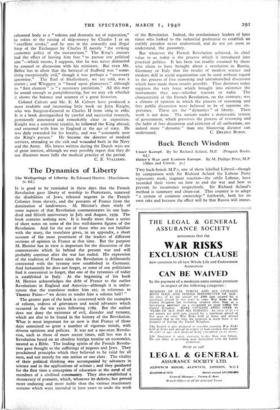The Dynamics of Liberty
Ir is good to be reminded in these days that the French Revolution gave liberty of worship to Protestants, removed the disabilities of Jews, released negroes in the French Colonies from slavery, and the peasants of France from the domination of landowners. M. Herriot's short study of some aspects of that Revolution commemorates its one hun- dred and fiftieth anniversary in July and August, 1939. The book contains nothing new. It is hardly more than a series of short notes on some of the less well-known figures of the Revolution. And for the use of those who are not familiar with the story, the translator gives, in an appendix, a short account of the most prominent of the leaders of different sections of opinion in France at that time. But the purpose M. Herriot has in view is important for the discussion of the controversies which lie behind the present war and will probably continue after the war has ended. His expression of the tradition of France since the Revolution is deliberately contrasted with the tyranny now established in Germany. And fortunately he does not forget, as some of our politicians find it convenient to forget, that one of the tyrannies of today is established in Italy. At the beginning of his book M. Herriot acknowledges the debt of France to the earlier Revolutions in England and America—although it is unfor- tunate that the translator makes him say, in reference to Thomas Paine—" we desire to tender him a solemn hail! "
The greater part of the book is concerned with the examples of reform, redress of grievances and social advances which occurred in the ten years following 1789. But the author does not deny the existence of evil, disorder and tyranny, which are also to be found in the history of the Revolution. What is most important for us now is that France of those days contained so great a number of vigorous minds, with diverse opinions and policies. It was not a one-man Revolu- tion, such as those of more recent times, still less was it a Revolution based on an obsolete foreign treatise on economics, treated as a Bible. The leading spirits of the French Revolu- tion gave thought to the sufferings of negroes and Jews. They proclaimed principles which they believed to be valid for all men, and not merely for one nation or one class. The vitality of their political thinking was accompanied by advances in science and in the applications of science ; and they produced for the first time a conception of education as the need of all members of a civilised cormsbusity. They alsovestablished- a democracy of peasants, which, 'whatever its defects; has proved more enduring and more stable than the various reactionary systems which were intended in later years to undo the work of the Revolution. Indeed, the revolutionary leaders of later times who looked to the industrial proletariat to establish an earthly paradise never understood, and do not yet seem to understand, the peasantry.
But whatever the French Revolution achieved, its chief value to us today is the process which it introduced into practical politics. It has been too readily assumed by those who claim to have brought about a revolution in Russia, Germany or Italy that the results of modern science and modern skill in social organisation can be used without regard to the process of free reasoning and untrammelled discussion which have made those results possible. Thus dictators today suppress the very force which brought into existence the instruments they use—whether tractors or radio. The characteristic of the French Revolution, on the contrary, was a climate of opinion in which the process of reasoning and free public discussion were believed to be of supreme im- portance. These are the " dynamics " of liberty. Their work is not done. The nations under a democratic system of government, which preserves the process of reasoning and the habit of free discussion and criticism of all authorities, are indeed More " dynamic " than any blustering dictator can














































 Previous page
Previous page